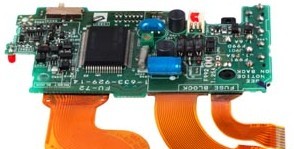 There are different circuit boards that can be used inside of technological applications. One of the most common types is called a rigid flex printed circuit board. This type of board utilizes both flexible and rigid board technologies within a specific application. While some rigid flex boards operate slightly differently than others, most of them contain multiple layers of flexible circuit substrates that are attached directly to rigid boards. The designs used to create rigid flex boards are more complex than those used to make a regular rigid board because they are created in a 3D space. This allows designers to roll, twist, or fold rigid flex boards so that they can fit into almost any application easily.
There are different circuit boards that can be used inside of technological applications. One of the most common types is called a rigid flex printed circuit board. This type of board utilizes both flexible and rigid board technologies within a specific application. While some rigid flex boards operate slightly differently than others, most of them contain multiple layers of flexible circuit substrates that are attached directly to rigid boards. The designs used to create rigid flex boards are more complex than those used to make a regular rigid board because they are created in a 3D space. This allows designers to roll, twist, or fold rigid flex boards so that they can fit into almost any application easily.
Rigid flex boards are used in many different types of applications. You will find them in everything from military weapons to cell phones. There are even some rigid flex boards used in medical devices because of the limited amount of space located within them. Rigid flex boards are an excellent option for so many different devices because they take up little space and are lightweight. They are also known for being reliable when they are installed properly in applications.
There is a laundry list of reasons why many technological companies are turning to rigid flex boards when creating applications. The vast majority of them do it because they use such a limited amount of space. But one of the other big advantages of using rigid flex boards is that they allow designers to reduce the number of connections that exist in between the parts on the board. That cuts down on the number of missed connections over time and increases reliability. It’s also easy to test rigid flex boards before they are placed into devices, and assembly costs are reduced dramatically when rigid flex boards are used.
If you would like to find out more about rigid flex boards, Northpoint Technologies specializes in providing them for companies. Call us at 915-591-6300 today for additional information on how they could benefit you.






